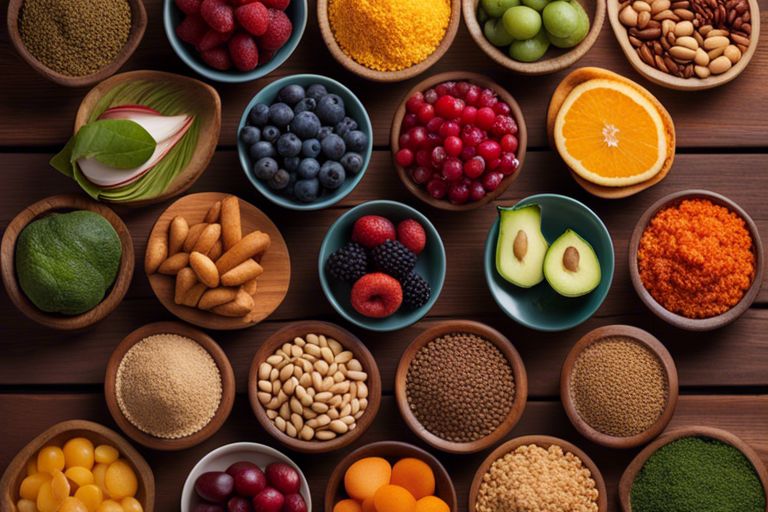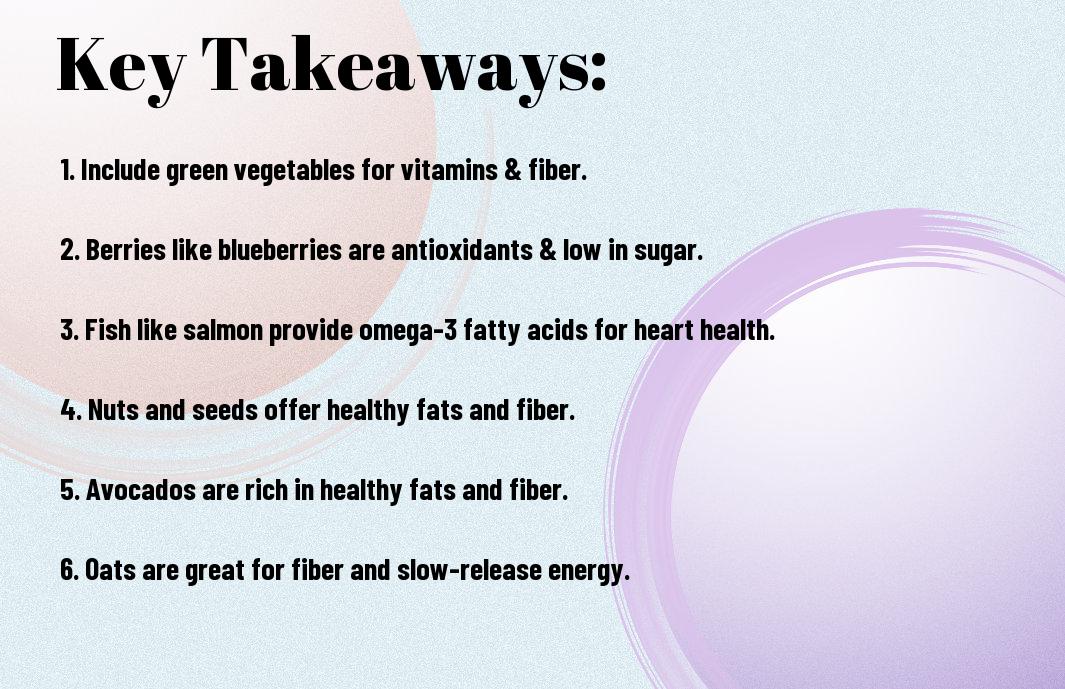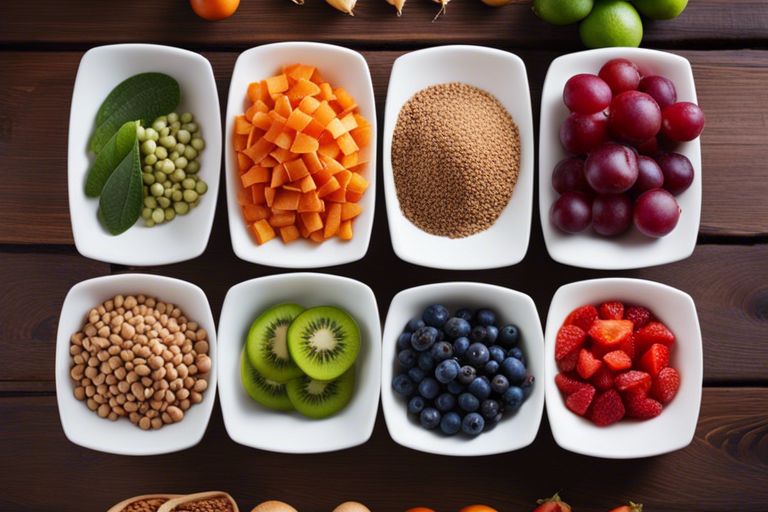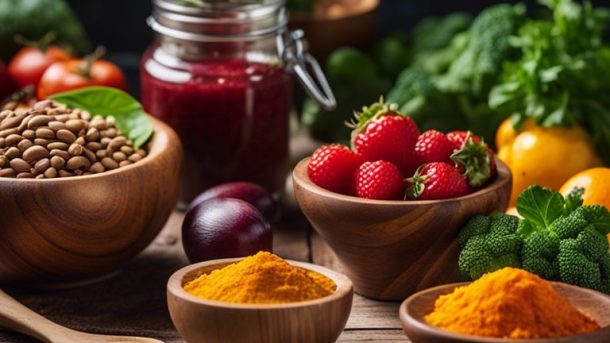There’s a simple rule to follow when it comes to choosing the best foods to nourish your body – “Eat food, not too much, mostly plants.” In a world filled with endless food options, it can be overwhelming to decide what to eat. To make it easier for you, here are the 7 best foods that should be a regular part of your diet to promote health and well-being. From leafy greens packed with nutrients to heart-healthy fats, these foods will have you feeling your best in no time.

Key Takeaways:
- Fruits and Vegetables: Include a variety of colorful fruits and vegetables in your diet for crucial vitamins, minerals, and antioxidants.
- Whole Grains: Opt for whole grains such as brown rice, quinoa, and whole wheat for fiber, nutrients, and sustained energy.
- Lean Proteins: Incorporate lean proteins like chicken, fish, tofu, or lentils for muscle development and overall health.
Nutrient-Dense Foods
For a healthy and balanced diet, incorporating nutrient-dense foods is imperative. These foods are rich in vitamins, minerals, and other imperative nutrients that are beneficial for your overall health and well-being. In this chapter, we will explore two superfoods that are packed with nutrients and offer numerous health benefits.
Leafy Greens: The Ultimate Superfood
To start off, leafy greens are the ultimate superfood that should have a prominent place on your plate. Spinach, kale, Swiss chard, and collard greens are all excellent choices that are loaded with vitamins A, C, and K, as well as minerals like iron and calcium. These greens are also rich in antioxidants and fiber, which can help support healthy digestion and reduce inflammation in your body.
Berries: Antioxidant Powerhouses
Ultimate antioxidant powerhouses, berries are a delicious and nutritious addition to your diet. Blueberries, strawberries, raspberries, and blackberries are known for their high levels of antioxidants, such as anthocyanins and vitamin C. These antioxidants can help protect your cells from damage caused by free radicals, and they may also have anti-inflammatory properties.
Another reason to include berries in your diet is their low calorie and high fiber content. This makes them a great option for satisfying your sweet cravings while benefiting from their nutritional value. Whether you enjoy them on their own, mixed into a smoothie, or topping your yogurt, incorporating berries into your daily meals can be a flavorful way to boost your health.

Protein-Rich Foods
Now let’s talk about the importance of including protein-rich foods in your diet. Protein is vital for building and repairing tissues in your body, and it also plays a crucial role in maintaining muscle mass and keeping you feeling full and satisfied after meals.
Fatty Fish: Brain and Heart Health
Fish is a fantastic source of high-quality protein that is also packed with vital omega-3 fatty acids. Fatty fish such as salmon, mackerel, and sardines are not only delicious but also incredibly beneficial for your brain and heart health. Omega-3 fatty acids found in these fish can help improve your mood, memory, and overall cognitive function. Additionally, they can reduce inflammation in your body and lower your risk of heart disease.
Eggs: The Perfect Protein Package
Heart-healthy eggs are a nutritional powerhouse, providing you with an excellent source of protein, vitamins, minerals, and antioxidants. Including eggs in your diet can help you maintain a healthy weight, support muscle growth, and promote brain function. The myth that eggs are bad for your heart health has been debunked, so feel free to enjoy them regularly as part of a balanced diet.
To make the most out of your eggs, opt for pasture-raised or omega-3 enriched eggs, which are higher in beneficial nutrients such as vitamin D and omega-3 fatty acids. Incorporating eggs into your meals can be a versatile and easy way to boost your protein intake and fuel your body with vital nutrients.
Whole Grains
Not sure which foods you should incorporate into your diet for optimal health? Check out The 7 Healthiest Foods You Should Eat and Why for some insightful information on the best options out there.
Quinoa: The Complete Protein Grain
Any health-conscious individual like yourself should consider including quinoa in your diet. This ancient grain is a complete protein, meaning it contains all nine important amino acids that your body cannot produce on its own. Quinoa is not only nutritious but also versatile, making it a great addition to salads, stir-fries, and even breakfast bowls.
Brown Rice: Fiber and Mineral Rich
Fiber is important for your digestive health, and brown rice is a fantastic source of this important nutrient. By choosing brown rice over white rice, you’re opting for a whole grain that retains its fiber content and important minerals, such as magnesium and manganese. This makes brown rice a nourishing choice for supporting your overall well-being.
Understanding the benefits of whole grains like quinoa and brown rice can help you make informed choices when it comes to your diet. By incorporating these nutritious options into your meals, you can fuel your body with the important nutrients it needs to thrive.
Healthy Fats
Despite what you may have heard, not all fats are bad for you. In fact, some fats are crucial for your overall health and well-being. By incorporating healthy fats into your diet, you can improve your heart health, brain function, and even aid in weight loss. Let’s explore some of the best sources of healthy fats that you should consider adding to your meals.
Avocados: Creamy and Nutritious
One of the best sources of healthy fats is the beloved avocado. Avocados are not only creamy and delicious but also packed with nutrients such as monounsaturated fats, which can help lower your bad cholesterol levels. Additionally, avocados are high in fiber, vitamins C, E, K, and B-6, as well as folate. By adding avocados to your salads, sandwiches, or smoothies, you can reap the benefits of these nutritious fruits.
Nuts and Seeds: Crunchy and Convenient
One easy way to incorporate healthy fats into your diet is by snacking on nuts and seeds. Nuts such as almonds, walnuts, and pistachios, as well as seeds like chia, flax, and hemp seeds, are excellent sources of omega-3 fatty acids and antioxidants. These nutrients can help reduce inflammation, support your immune system, and even aid in weight management. By keeping a stash of mixed nuts or seeds at your desk or in your bag, you can enjoy a convenient and nutritious snack whenever hunger strikes.
Adding a variety of nuts and seeds to your diet can provide you with an array of nutrients and health benefits. Just remember to consume them in moderation, as they are calorie-dense foods. Incorporating a handful of nuts or seeds into your meals or snacks can help you stay satisfied and energized throughout the day, all while supporting your overall health and well-being.

Fermented Foods
Kimchi: Spicy and Probiotic-Rich
After a long day, there’s nothing like a flavorful dish of kimchi to add a burst of spicy tanginess to your meal. This traditional Korean staple is not only delicious but also packed with probiotics that can benefit your gut health. The fermentation process involved in making kimchi creates a rich source of beneficial bacteria that can help improve digestion and boost your immune system. So, the next time you’re looking to add some excitement to your plate, consider incorporating kimchi for a flavorful and gut-friendly option.
Yogurt: Gut Health and Calcium
To round out your list of nutrient-dense foods, don’t forget about the versatile and creamy yogurt. This dairy product is not only a delicious snack or breakfast option, but it also offers a range of health benefits. Yogurt is a rich source of calcium, which is necessary for maintaining strong bones and teeth. Additionally, yogurt is packed with probiotics, the good bacteria that can help promote a healthy gut microbiome.
Fermented foods like yogurt have been linked to a variety of health benefits, including improved digestion, reduced inflammation, and enhanced immune function. By incorporating yogurt into your daily diet, you can support your gut health and overall well-being.
Beverages
Green Tea: Antioxidant and Anti-Inflammatory
To start your day with a refreshing and health-boosting beverage, you might want to consider a cup of green tea. Green tea is packed with antioxidants and compounds that have anti-inflammatory properties. These properties can help reduce inflammation in your body, which is linked to various chronic diseases.
Water: The Ultimate Hydrator
One of the simplest and most crucial beverages you can consume daily is water. Staying hydrated is crucial for your overall health and well-being. Water helps regulate your body temperature, aids in digestion, and keeps your organs functioning properly.
Ultimate hydration comes from pure, clean water. Make sure to drink an adequate amount of water throughout the day to keep your body functioning optimally. You can also infuse your water with fruits or herbs for added flavor and nutrients.
Conclusion
To wrap up, focusing on a diet that includes a variety of whole, nutrient-dense foods can benefit your overall health and well-being. By incorporating foods like berries, fatty fish, leafy greens, nuts and seeds, whole grains, avocado, and yogurt into your daily meals, you are providing your body with vital vitamins, minerals, and antioxidants that can support your immune system, brain health, and even help reduce the risk of chronic diseases.
Be mindful of, balance and moderation are key when it comes to your diet. Enjoying a wide range of foods while listening to your body’s hunger and fullness cues will help you maintain a healthy relationship with food and nourish your body in the best way possible. So go ahead and explore the world of delicious and nutritious foods that can benefit your health and well-being. Your body will thank you for it!
FAQ
Q: What are the 7 best foods to eat for overall health?
A: The 7 best foods to eat for overall health are: leafy greens, berries, nuts and seeds, fatty fish, whole grains, lean protein, and probiotics. These foods are nutrient-dense and provide a wide range of vitamins, minerals, and other vital nutrients.
Q: How can leafy greens benefit my health?
A: Leafy greens such as kale, spinach, and Swiss chard are packed with vitamins, minerals, and antioxidants. They are low in calories but high in fiber, which can promote good digestion and help with weight management. Leafy greens also contain important nutrients like vitamin K, which is vital for bone health.
Q: Why are probiotics considered one of the best foods to eat?
A: Probiotics are “good” bacteria that promote a healthy gut microbiome. They can improve digestion, boost the immune system, and even support mental health. Probiotic-rich foods include yogurt, kefir, sauerkraut, and kimchi. Adding these foods to your diet can help maintain a healthy balance of gut bacteria.


